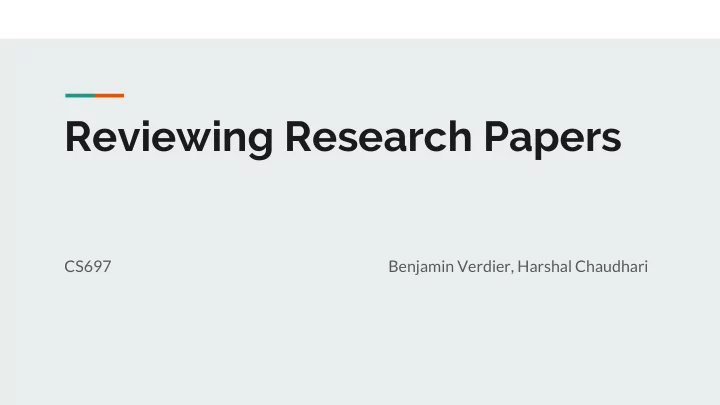

Reviewing Research Papers CS697 Benjamin Verdier, Harshal Chaudhari
Why is it Important?
Accepting a paper to review Quality of journal / conference. ● Field of expertise. ● Conflict of interests. ● Ability to finish the review in timely manner. ●
The review process Source: Durning SJ, Carline JD, eds. Review Criteria for Research Manuscripts, 2nd ed. Washington, DC: Association of American Medical Colleges; 2015.
The Two Roles of the Reviewer Assess the quality of a paper to see if it is fit for publication ● List potential revisions for the writer ● From The Task of the Referee by Alan Jay Smith
What Makes a Good Paper? Correctness Succinctness ● ● Significance Accessibility ● ● Innovation Elegance ● ● Interest Readability ● ● Timeliness Style ● ● Polish Organization ● ● Clear Figures and Tables Good Writing ● ● From A Guide for New Referees in Theoretical Computer Science by Ian Parberry
Research Question Clear problem statement and context. ● Conceptual framework is identified. ● Places the research in context of the related literature. ● Relevance to journal or conference. ●
Research Design Concise but enough details about methodology. ● Assumptions, settings, conditions, etc. clearly explained. ● Research design allows both internal validation as well as external (quantitative studies). ● Research design is generalizable. ●
Experiments and their results For quantitative studies, data properties are sufficiently described. ● Experimental setup is thoroughly described to allow reproducibility. ● Experiments are appropriate for the research problem. ● Results align with study claims and are presented in a parseable manner. ● Correct use of statistical tools. ●
Discussions and Conclusions Appropriate interpretation of results, and key achievements stand out. ● Limitations of study are discussed. ● Discussion on implications of study, both practically and theoretically. ●
What to Write in the Review?
Review structure Brief summary. ● Recommendation - Accept, Weak Accept, Weak Reject, Reject. ● Strengths and Weaknesses. ● Detailed Review. ● Confidential comments to the Editor. ●
What Makes a Good Reviewer? Objectivity Confidentiality ● ● Fairness Honesty ● ● Speed Courtesy ● ● Professionalism ● From A Guide for New Referees in Theoretical Computer Science by Ian Parberry
WWAGRD? (What Would A Good Reviewer Do?) You are asked to review a paper in a field you are an expert in. Halfway through your second read, you notice that a whole section is more or less a copy-paste of a paper you authored. What would you do?
WWAGRD? (What Would A Good Reviewer Do?) You are asked to review a paper in a field you are an expert in. When you get to the results section, you notice the paper completely nullifies something you are actively working on. What would you do?
WWAGRD? (What Would A Good Reviewer Do?) You are asked to review a paper in a field you are an expert in. You notice that same authors have multiple published papers with minor differences in problem statements or methodologies. What would you do?
WWAGRD? (What Would A Good Reviewer Do?) You are asked to review a paper in a field you are an expert in. In a double-blind submission, while researching related works on Google Scholar, you discover the identity of the paper’s authors. What would you do?
References The Task of the Referee by Alan Jay Smith ● A Guide for New Referees in Theoretical Computer Science by Ian Parberry ● Durning SJ, Carline JD, eds. Review Criteria for Research Manuscripts, 2nd ed. Washington, DC: ● Association of American Medical Colleges; 2015.
Recommend
More recommend